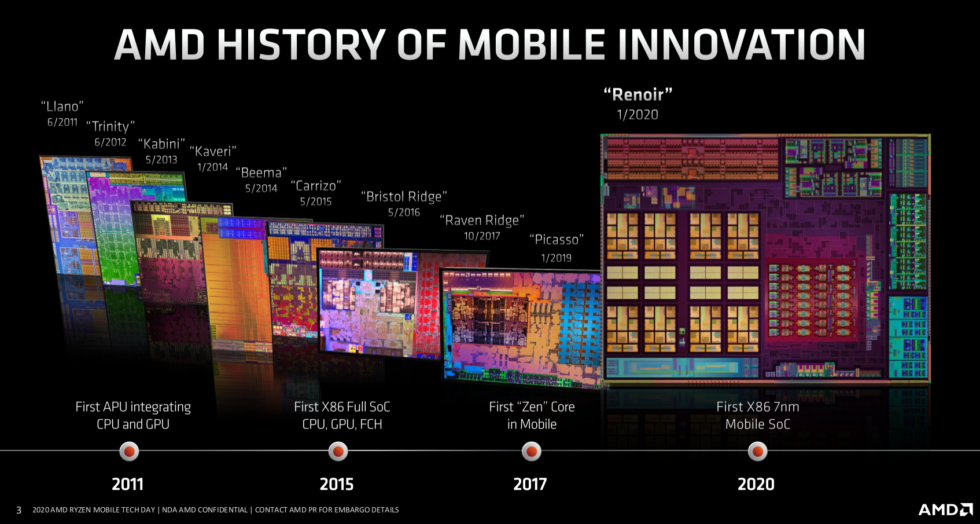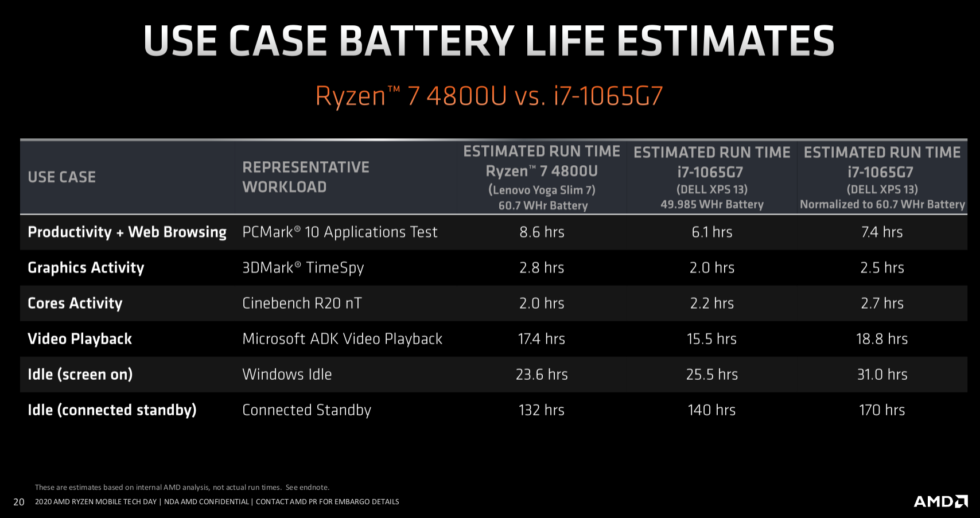
AMD Announced Ryzen 4000 Mobile Chip Series for Laptops
- AMD announced its next generation of mobile Ryzen chips, and it's the most advanced ever.
- The Zen 2 architecture finally brings unprecedented power and thermal efficiency.
- This will be the generation to change how OEMs and consumers view AMD on laptops.
AMD has announced their latest mobile chips range, bumping up the number to "4000", and covering the full model range from Ryzen 3 up to Ryzen 9. These new processors are made with the 7nm fabrication technology, incorporate AMD Radeon graphics, and support dual-channel DDR4 3200, or LPDDR4 of up to 4266Mhz of speed. The top of the range, the Ryzen 9 4900, has a base clock of 3.3 GHz, reaching 4.4 GHz at "boost" mode, eight cores, sixteen threads, 8MB L3 Cache, and a power consumption rating of 45 Watt. The lowest is the Ryzen 3 4300U, with four cores running at 2.7 GHz (10W), going up to 3.7 GHz when pushed (25W).
Source: AMD
AMD calls this new mobile chipset "the most advanced laptop processor ever", and they have every right to use this characterization. The time to implement the AMD Zen 2 architecture on mobile chipsets has finally come, and this brings both unprecedented multi-core power on the go, as well as the very much needed power efficiency. The 3000 series was competitive to Intel's offerings in many ways, but it could by no means compare in terms of battery consumption. The 7nm of the new generation will surely take things to a whole new level. AMD has run some benchmarks and presented a comparison of Ryzen 7 4800U and Intel's i7-1065G7, claiming significant wins across all measurement tests.
Source: AMD
In terms of the performance of the Ryzen 4000, AMD is ahead of Intel on multi-core and graphics, while in the single-thread performance, the battle is head to head. In numbers, the graphics processing power ranges from 896 GFLOPS on the Ryzen 3 4300U and reaches up to 1792 GFLOPS on the Ryzen 9 4900H. This makes the new generation a whole 59% more efficient than the previous generation, which is a leap rather than a step forward. Not even Intel's latest and greatest Iris+ can compare to AMD's superior integrated GPU system.
Source: AMD
All that said, and with support for WiFi 6, FreeSync, and better thermal engineering, laptop OEMs are bound to start taking AMD very seriously. The 4000 Series will enable laptop manufacturers to build very slim models that are capable of delivering gaming and productivity-level performance. The days when AMD was viewed merely as the cost-focused option are numbered, and it will only be a matter of availability now. Speaking of which, the whole Covid-19 outbreak situation will unquestionably have a negative impact on AMD's supply chain. For the time being, the chipmaker has announced an embargo to third-party reviewers who wanted to test out the 4000 Series, due to a lack of availability.









